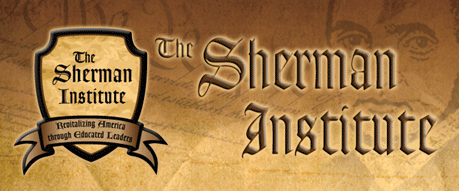
• Populists concerned about Republican candidate’s rabid internationalism, unabashed love for Israel
By Michael Collins Piper
If Rep. Ron Paul (R-Tex.) hopes to mold the Republican Party’s 2012 national campaign platform into a document of nationalism and non-interventionism, he has a tough job ahead, for the global outlook of all-but-certain GOP presidential nominee Mitt Romney is firmly internationalist and interventionist.
In fact, as AFP noted on Oct. 24, 2011, Romney’s first major foreign policy address delivered on Oct. 7 at the Citadel was a declaration of budget-busting, round-the-planet meddling, a promise of unending wars against an array of perceived enemies, ranging from Iran, Russia, China, Pakistan and billions of Muslims across the Earth.
“Endless trillions,” concluded AFP, “will continue to go down the black holes of the military-industrial banking police state.”
A rabid call for U.S. adventurism, Romney’s speech was full of rhetoric that, on its face, had a lot of energetic fervor that appealed to many good American patriots. He declared:
This century must be an American century. In an American century, America leads the free world and the free world leads the entire world. God did not create this country to be a nation of followers. America is not destined to be one of several equally balanced global powers. America must lead the world, or someone else will. Without American leadership,without clarity of American purpose and resolve, the world becomes a far more dangerous place, and liberty and prosperity would surely be among the first casualties.
However, while the language reflects the views expressed in Romney’s campaign book No Apology: The Case for American Greatness, there’s much more to it than meets the eye. And this is what is important for real patriots to understand:
The concept of an “American century”—a catchphrase of American internationalists of the Council on Foreign Relations school of thought going back to the post-World War II era—has seen its most recent incarnation in the theme of “American greatness”—also known as “American exceptionalism”—bandied about by the ex-Trotskyite hard-line pro-Israel neo-conservatives who orchestrated the United States into the no-win war in Iraq and who now push for a war against Iran.
Romney’s linguistics constitute a modern-day propaganda cover for old-fashioned Trostkyite communism: rapacious imperialism and internationalism wrapped in the American flag, but no different from the age-old dream of a world imperium—a global government—a New World Order.
The specific foreign policy aims expressed by Romney were a virtual wish list for warmongers and profit-driven plutocrats. Although none of Romney’s five sons served in uniform, their father calls for a significant—some say “muscular”—role for the U.S. military abroad. Romney said, in part:



We are at war with Islamic fundamentalism. We must fight against the most ancient of prejudices: anti-Semitism.
In my first 100 days in office, I will . . . announce an initiative to increase the shipbuilding rate from nine ships per year to 15 [ships per year].
I will begin . . . the full deployment of a multi-layered national ballistic missile defense system. I will enhance our deterrent against the Iranian regime by ordering the regular presence of aircraft carrier task forces, one in the Eastern Mediterranean and one in the Persian Gulf region.
I will begin discussions with Israel to increase the level of our military assistance and coordination . . . an Iranian nuclear weapon is unacceptable. I will launch a campaign to advance economic opportunity in Latin America . . . free trade . . . I will reaffirm as a vital national interest Israel’s existence as a Jewish state. I will count as dear our special relationship with the United Kingdom. . . .
Romney’s saber-rattling against Iran, ritually embracing the mantra that Iran is a threat to not only Israel but to the United States, has been supplemented with equally dangerous bombast.
On CNN, Romney actually described modern Russia as America’s “number one geopolitical foe,” charging Russia “lines up with the world’s worst actors,” and that “Russia is not a friendly character on the world stage.”
That these words sound familiar is no surprise, considering those who constitute Romney’s most intimate advisors.
Notable among those whispering in Romney’s ear is Eliot A. Cohen—a longtime and foremost figure in military and geostrategic affairs, one of the most influential of the Zionist neo-conservative internationalists active today. A founding member of the neo-conservative Project for the New American Century—famed for suggesting America needed a “New Pearl Harbor” in order to jump-start U.S. involvement in new global military ventures—Cohen is one of multiple “neo-cons” who populate Romney’s inner circle.
But even more so, Romney prizes, in particular, an unusually close and long-standing personal (and political) alliance—going back 36 years—with no less than Israeli PM Benjamin Netanyahu.
First openly revealed in candid detail by The New York Times on April 7—to the genuine surprise of many who were confounded by the link between the Michigan-born former Mormon missionary and the cosmopolitan Israeli-born Jew who graduated from high school in suburban Philadelphia—the Times described the relationship as “a warm friendship, little known to outsiders, that is now rich with political intrigue.”
Emphasizing that the Romney-Netanyahu axis is additionally “strengthened by a network of mutual friends and heightened by their conservative ideologies” the Times commented frankly that “the ties between Mr. Romney and Mr. Netanyahu stand out because there is little precedent for two politicians of their stature to have such a history together that predates their entry into government.”
The two met in 1976 while working at the Boston Consulting Group. Remaining in close contact, they regularly advised one another after both went into government on both domestic and foreign policy, having absorbed, the Times said, “the same profoundly analytical view of the world.”
What is disturbing—at least to American nationalists—is that, as the Times noted, “Romney has suggested that he would not make any significant policy decisions about Israel without consulting Mr. Netanyahu.” Even the Times—a staunchly pro-Israel voice—noted that this was “a level of deference that could raise eyebrows given Mr. Netanyahu’s polarizing reputation.”
Michael Collins Piper is an author, journalist, lecturer and radio show host. He has spoken in Russia, Malaysia, Iran, Abu Dhabi, Japan, Canada and the U.S.



